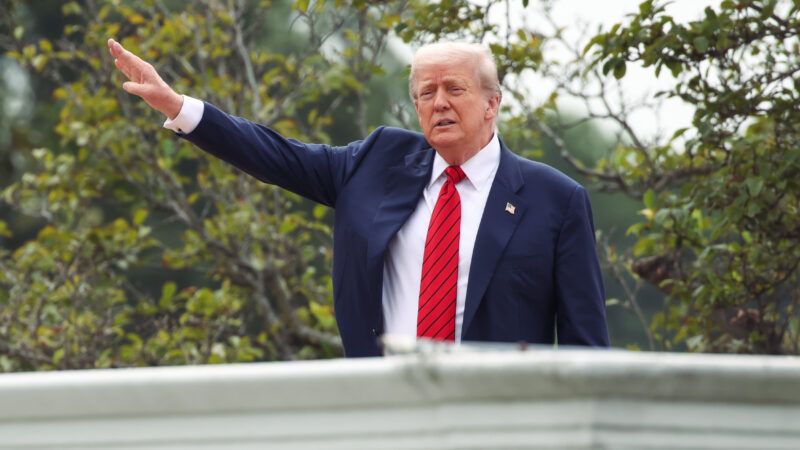Federal Circuit Judges Question Trump's Discovery of Vast Tariff Powers
The president is claiming "unbounded authority" to impose import taxes based on a law that does not mention them.

Half a century ago, according to the Trump administration, Congress enacted a law that gave the president sweeping authority to completely rewrite U.S. tariff schedules. But for some reason, no president took advantage of that power until last February.
That story received a skeptical reception last week at the U.S. Court of Appeals for the Federal Circuit, and it is not hard to see why. The legal pretext for President Donald Trump's stiff, wide-ranging, ever-changing import taxes defies credulity as well as the separation of powers.
In February, Trump announced taxes on imports from Mexico, Canada, and China, which he said were aimed at encouraging increased cooperation in the war on drugs. Two months later, he announced a much broader set of "reciprocal" tariffs that applied to dozens of countries, citing "large and persistent annual U.S. goods trade deficits."
The problems that Trump claimed to be addressing are not new: Drug-related deaths have been rising for decades, and the U.S. has not run a trade surplus since 1975. Yet in both cases, Trump asserted an "unusual and extraordinary threat" that he said constituted a "national emergency" under the International Emergency Economic Powers Act (IEEPA).
Trump's invocation of that 1977 law was politically appealing but legally dubious. Congress has explicitly authorized tariffs in several statutes, all of which involve conditions, limits, and procedures that Trump found inconvenient.
IEEPA, by contrast, does not mention tariffs at all. And as Assistant Attorney General Brett Shumate conceded during oral arguments before an 11-judge Federal Circuit panel last Thursday, "this is the first time IEEPA has been used for tariffs."
Shumate nevertheless argued that Congress broadly delegated its tariff power to the president by authorizing him to "regulate importation." The same phrase, he noted, appeared in the Trading With the Enemy Act, a 1917 law that federal courts construed to allow a 10 percent import surcharge that President Richard Nixon had briefly imposed in 1971.
That case, however, involved a time-limited, relatively modest levy that fell within the tariff rates authorized by Congress—a point that was crucial to the decision. Trump, by contrast, is asserting the power to set whatever rates he wants, regardless of what Congress has said.
On May 28, the U.S. Court of International Trade (CIT) rejected that interpretation of IEEPA, saying Trump was claiming "an unlimited delegation of tariff authority" that "would be unconstitutional." The Federal Circuit is reviewing that decision, and last week several of its members seemed inclined to agree with the CIT, expressing concern that Trump is asserting "unbounded authority" to impose tariffs.
Not so, Shumate said. Although IEEPA gives the president "broad discretion to deal with complex and evolving national emergencies," he explained, it includes "four limits." He noted that the president has to 1) declare a national emergency 2) caused by "an extraordinary and unusual threat" that 3) originates outside the United States and 4) take action to "deal with" that threat.
At the same time, Shumate insisted that the courts have no role in assessing whether the president has complied with those requirements. Neal Katyal, the attorney who spoke on behalf of several businesses that challenged Trump's tariffs, summed up the implication: "The president can do whatever he wants, whenever he wants, for as long as he wants, so long as he declares an emergency."
That is "a breathtaking claim to power that no president has asserted in 200 years," Katyal noted, "and the consequences are staggering." It is "as major a question as it gets," he said, alluding to the doctrine that says Congress must "speak clearly" when it assigns powers of "vast 'economic and political significance'" to the executive branch.
The Supreme Court invoked the "major questions" doctrine, which aims to maintain the separation of powers, when it rejected the Biden administration's national eviction moratorium and its mass cancellation of student debt. Trump should not expect that his power grab will fare any better in the courts.
© Copyright 2025 by Creators Syndicate Inc.


Show Comments (64)